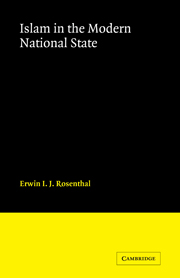Book contents
- Frontmatter
- Contents
- Introduction
- Acknowledgements
- Abbreviations
- Note on transliteration
- PART I CONTEMPORARY ISLAM IN CRISIS AND TRANSITION
- SECTION 1
- 1 The Human Situation
- 2 Classical Foundations
- SECTION 2 ISLAMIC OR MODERN NATIONAL STATE?
- PART II ISLAM IN THE MODERN NATIONAL STATE
- Epilogue
- Notes
- Select Bibliography
- Index
2 - Classical Foundations
Published online by Cambridge University Press: 05 September 2013
- Frontmatter
- Contents
- Introduction
- Acknowledgements
- Abbreviations
- Note on transliteration
- PART I CONTEMPORARY ISLAM IN CRISIS AND TRANSITION
- SECTION 1
- 1 The Human Situation
- 2 Classical Foundations
- SECTION 2 ISLAMIC OR MODERN NATIONAL STATE?
- PART II ISLAM IN THE MODERN NATIONAL STATE
- Epilogue
- Notes
- Select Bibliography
- Index
Summary
A brief consideration of the classical concept of the state in Islam and its relevance for contemporary thought and action may be useful. Oversimplified, historical continuity can be preserved and reactivated as a positive force in a Muslim polity in one of two ways: either by the renewal of Islam as a faith and way of life with or without the Sharī‘a or a part of it; or by a secularised Islam, that is, part of a Muslim's mental being: an historical memory of value and meaning; an indispensable cultural heritage to be integrated with contemporary philosophical and scientific trends.
THE CONCEPT OF THE “KHILĀFA” OR “IMĀMA”
If umma designates the community of believers as a religious society, its political organisation is contained and its protection of life and property guaranteed in the khilāfa or imāma. Under the sovereignty of God and the authority of His law, the Sharī‘a of Islam, the caliph is the temporal ruler of the state and the defender of the faith. As such he is charged with implementing the Sharī‘a, for its application in the everyday life of individual and society secures wellbeing in this world and bliss in the hereafter.
How and when did the Sharī‘a arise and achieve its dominant position as the constitution and the law of the Islamic state? Jurisprudence (‘ilm al-fiqh), the science of law, is “the knowledge of the rights and duties whereby man is enabled to observe right conduct in this life, and to prepare himself for the world to come”.
- Type
- Chapter
- Information
- Islam in the Modern National State , pp. 12 - 27Publisher: Cambridge University PressPrint publication year: 1965
- 1
- Cited by



